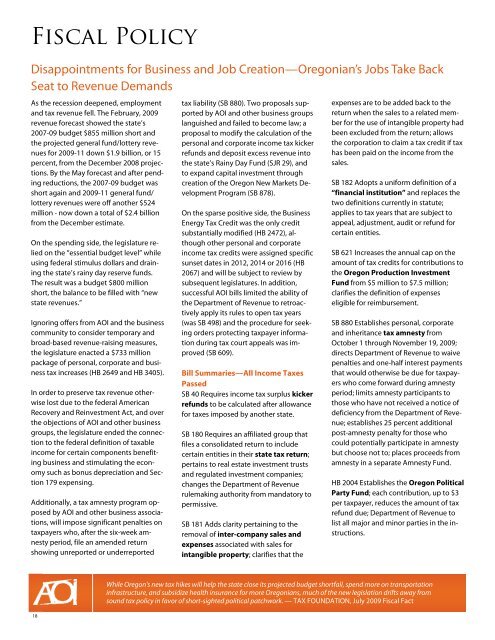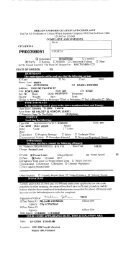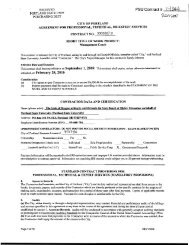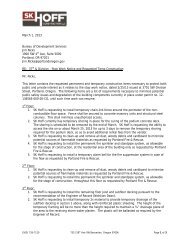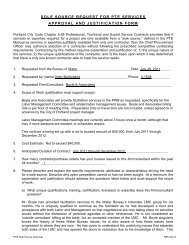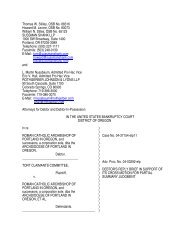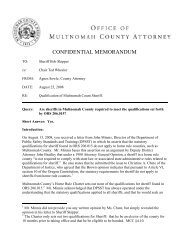AOI OREGON BUSINESS REPORT
AOI OREGON BUSINESS REPORT
AOI OREGON BUSINESS REPORT
Create successful ePaper yourself
Turn your PDF publications into a flip-book with our unique Google optimized e-Paper software.
Fiscal Policy<br />
Disappointments for Business and Job Creation—Oregonian’s Jobs Take Back<br />
Seat to Revenue Demands<br />
As the recession deepened, employment<br />
and tax revenue fell. The February, 2009<br />
revenue forecast showed the state’s<br />
2007-09 budget $855 million short and<br />
the projected general fund/lottery revenues<br />
for 2009-11 down $1.9 billion, or 15<br />
percent, from the December 2008 projections.<br />
By the May forecast and after pending<br />
reductions, the 2007-09 budget was<br />
short again and 2009-11 general fund/<br />
lottery revenues were off another $524<br />
million - now down a total of $2.4 billion<br />
from the December estimate.<br />
On the spending side, the legislature relied<br />
on the “essential budget level” while<br />
using federal stimulus dollars and draining<br />
the state’s rainy day reserve funds.<br />
The result was a budget $800 million<br />
short, the balance to be filled with “new<br />
state revenues.”<br />
Ignoring offers from <strong>AOI</strong> and the business<br />
community to consider temporary and<br />
broad-based revenue-raising measures,<br />
the legislature enacted a $733 million<br />
package of personal, corporate and business<br />
tax increases (HB 2649 and HB 3405).<br />
In order to preserve tax revenue otherwise<br />
lost due to the federal American<br />
Recovery and Reinvestment Act, and over<br />
the objections of <strong>AOI</strong> and other business<br />
groups, the legislature ended the connection<br />
to the federal definition of taxable<br />
income for certain components benefiting<br />
business and stimulating the economy<br />
such as bonus depreciation and Section<br />
179 expensing.<br />
Additionally, a tax amnesty program opposed<br />
by <strong>AOI</strong> and other business associations,<br />
will impose significant penalties on<br />
taxpayers who, after the six-week amnesty<br />
period, file an amended return<br />
showing unreported or underreported<br />
tax liability (SB 880). Two proposals supported<br />
by <strong>AOI</strong> and other business groups<br />
languished and failed to become law; a<br />
proposal to modify the calculation of the<br />
personal and corporate income tax kicker<br />
refunds and deposit excess revenue into<br />
the state’s Rainy Day Fund (SJR 29), and<br />
to expand capital investment through<br />
creation of the Oregon New Markets Development<br />
Program (SB 878).<br />
On the sparse positive side, the Business<br />
Energy Tax Credit was the only credit<br />
substantially modified (HB 2472), although<br />
other personal and corporate<br />
income tax credits were assigned specific<br />
sunset dates in 2012, 2014 or 2016 (HB<br />
2067) and will be subject to review by<br />
subsequent legislatures. In addition,<br />
successful <strong>AOI</strong> bills limited the ability of<br />
the Department of Revenue to retroactively<br />
apply its rules to open tax years<br />
(was SB 498) and the procedure for seeking<br />
orders protecting taxpayer information<br />
during tax court appeals was improved<br />
(SB 609).<br />
Bill Summaries—All Income Taxes<br />
Passed<br />
SB 40 Requires income tax surplus kicker<br />
refunds to be calculated after allowance<br />
for taxes imposed by another state.<br />
SB 180 Requires an affiliated group that<br />
files a consolidated return to include<br />
certain entities in their state tax return;<br />
pertains to real estate investment trusts<br />
and regulated investment companies;<br />
changes the Department of Revenue<br />
rulemaking authority from mandatory to<br />
permissive.<br />
SB 181 Adds clarity pertaining to the<br />
removal of inter-company sales and<br />
expenses associated with sales for<br />
intangible property; clarifies that the<br />
expenses are to be added back to the<br />
return when the sales to a related member<br />
for the use of intangible property had<br />
been excluded from the return; allows<br />
the corporation to claim a tax credit if tax<br />
has been paid on the income from the<br />
sales.<br />
SB 182 Adopts a uniform definition of a<br />
“financial institution” and replaces the<br />
two definitions currently in statute;<br />
applies to tax years that are subject to<br />
appeal, adjustment, audit or refund for<br />
certain entities.<br />
SB 621 Increases the annual cap on the<br />
amount of tax credits for contributions to<br />
the Oregon Production Investment<br />
Fund from $5 million to $7.5 million;<br />
clarifies the definition of expenses<br />
eligible for reimbursement.<br />
SB 880 Establishes personal, corporate<br />
and inheritance tax amnesty from<br />
October 1 through November 19, 2009;<br />
directs Department of Revenue to waive<br />
penalties and one-half interest payments<br />
that would otherwise be due for taxpayers<br />
who come forward during amnesty<br />
period; limits amnesty participants to<br />
those who have not received a notice of<br />
deficiency from the Department of Revenue;<br />
establishes 25 percent additional<br />
post-amnesty penalty for those who<br />
could potentially participate in amnesty<br />
but choose not to; places proceeds from<br />
amnesty in a separate Amnesty Fund.<br />
HB 2004 Establishes the Oregon Political<br />
Party Fund; each contribution, up to $3<br />
per taxpayer, reduces the amount of tax<br />
refund due; Department of Revenue to<br />
list all major and minor parties in the instructions.<br />
While Oregon's new tax hikes will help the state close its projected budget shortfall, spend more on transportation<br />
infrastructure, and subsidize health insurance for more Oregonians, much of the new legislation drifts away from<br />
sound tax policy in favor of short-sighted political patchwork. — TAX FOUNDATION, July 2009 Fiscal Fact<br />
18


